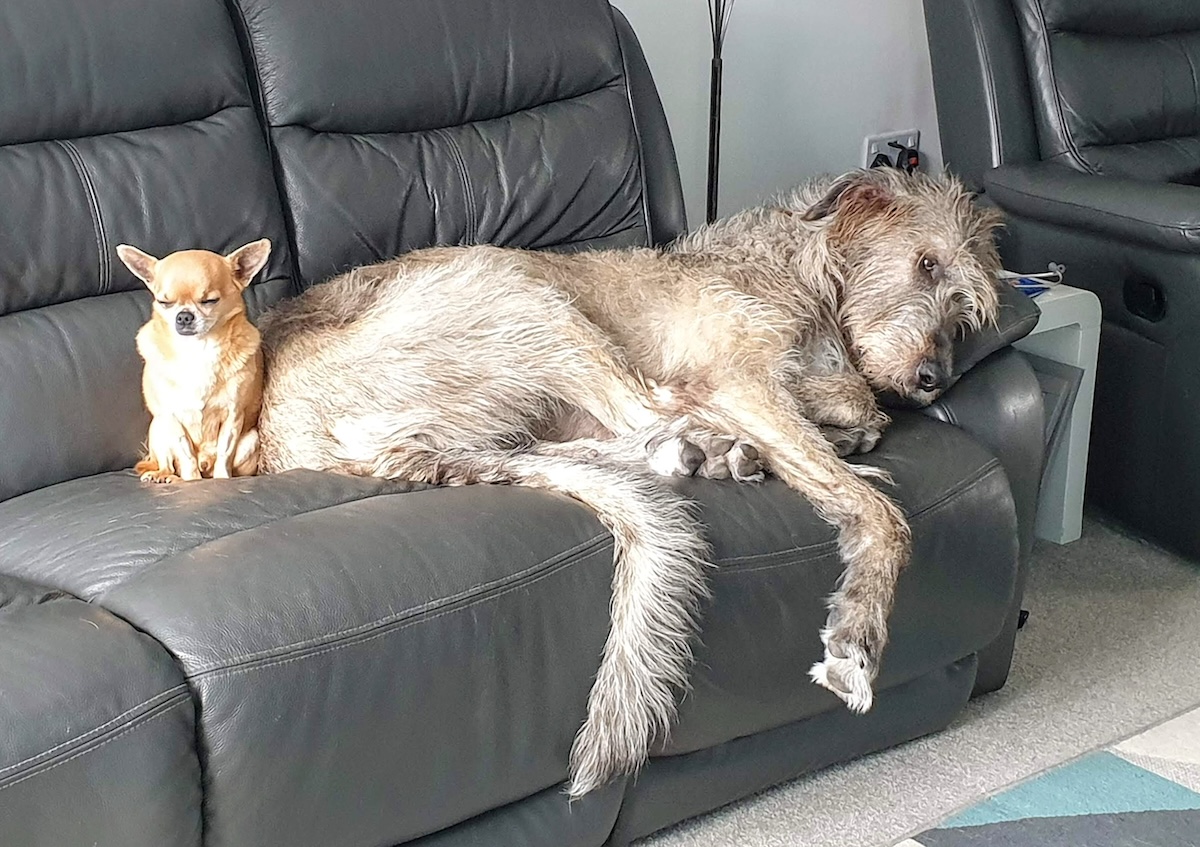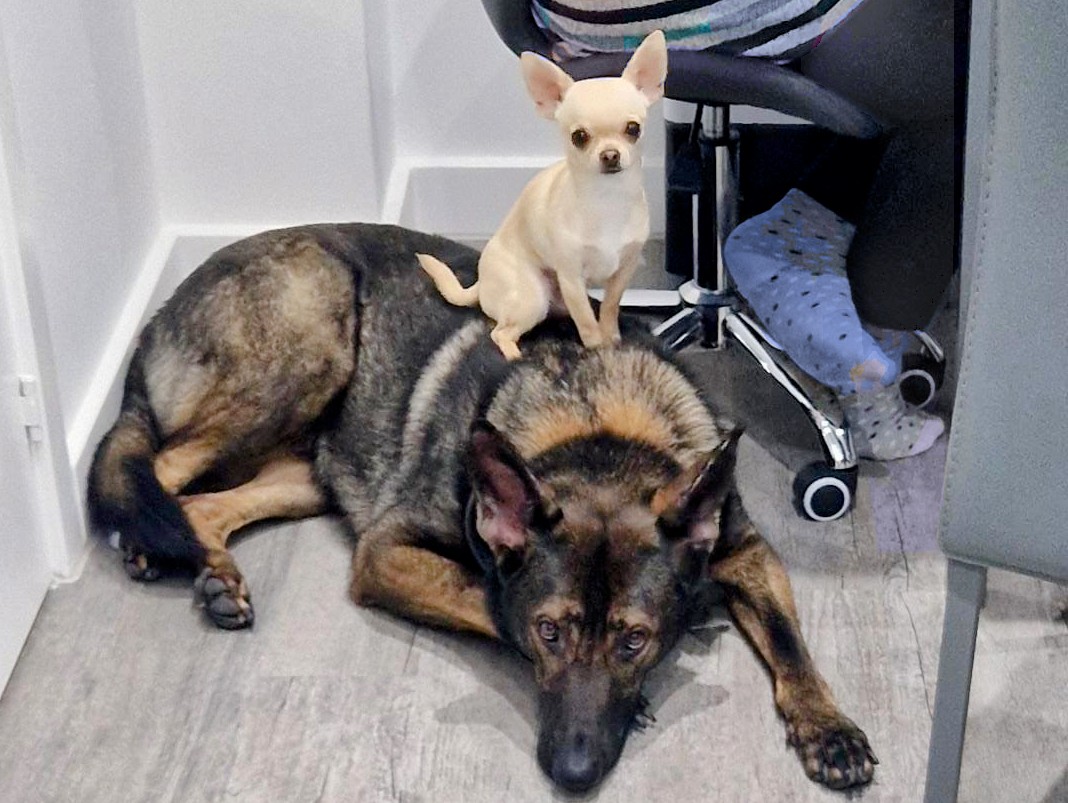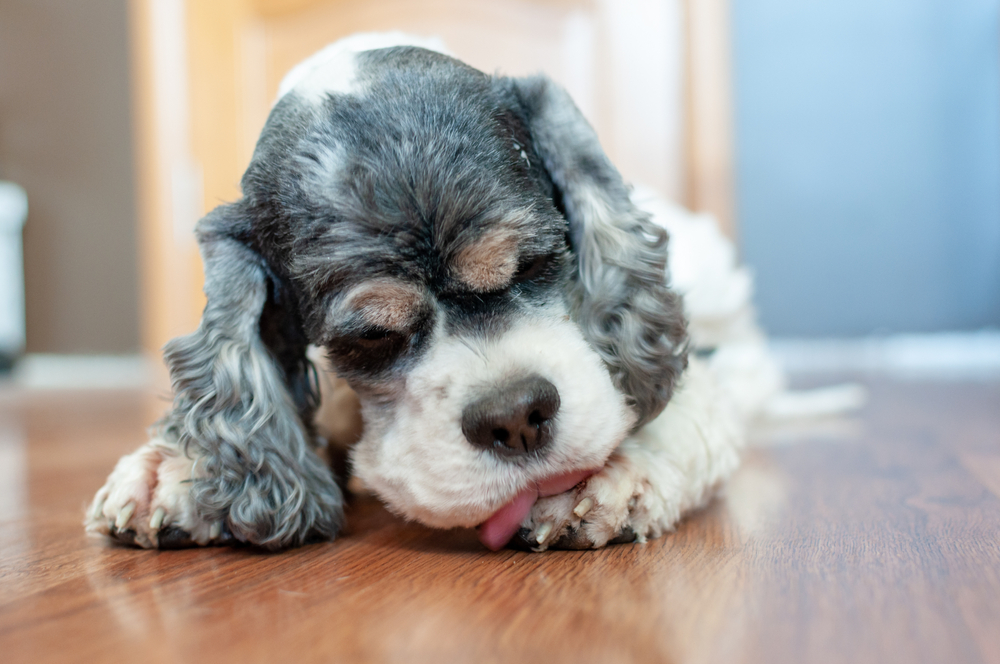Hi, I’m Dr. Karyn! Read my introduction to learn more about me and my five funny dogs, Poppy, Bailey, Kodah, Ned, and Fred.
We were always a large dog family; two Labradors and an Irish Wolfhound – it couldn’t get much larger than that. Within this trio of large and larger dogs, Poppy ruled the roost with a calm and quiet poise. Despite being twice her height, Finn, and later, Remus, accepted her leadership without question. When Potato, the rescue Chihuahua with a boatload of personality, joined the pack, I was a little worried about what Remus would make of him, and how ‘Tate’ would react to this towering hound. The answer? With confidence and aplomb.
His head held high and tail aloft, Tate made it very clear where he stood in the pecking order: shoulder-to-shoulder with Poppy, and miles above poor Remus! Tate’s dominance over the 150 pound Wolfhound was so well-established that Remus would never approach the Chihuahua’s food bowl, even when he was out of the room!

When Remus passed away, Kodah, the boisterous and lively German Shepherd x Malinois entered the fray, and Tate did not hesitate to let the little whippersnapper know who was boss. Kodah was almost 18 months old when we tragically lost Tate, and to help fill the enormous hole he left in our hearts, we brought home tiny Ned.
I’m not going to lie; I was worried about how this introduction would go. Kodah found new dogs beyond exciting, and wasn’t always the best at reigning himself in. It turns out there was no cause for concern.
Tiny Dogs on Top
I don’t know if it was the legacy of Tate’s strict tutelage, or the tendency for small dogs to work extra hard at reaching the top of the pile, but it took just one angry yap in Kodah’s direction for Ned to solidify his position in Tate’s shoes. And when Fred came along, he didn’t hesitate to join his cousin Ned on top of Kodah – figuratively and literally.

The interesting thing about Kodah is that, despite being a lively, confident, and intelligent boy, he seems to be happiest when following directions. It’s no wonder these dogs are often employed by the police and armed forces! With the exception of the occasional lip curl when Ned or Fred attempt to dip into his food bowl, Kodah is never anything but gentle in his dealings with the Chihuahuas; I cannot say the same for how they treat him!
Despite Kodah being more than ten times their size, Ned and Fred show zero hesitation when it comes to jumping on his back, pulling at his fur, hanging off his face, and taking toys from his mouth. And if I’m interpreting things correctly, Kodah absolutely loves it. I have often observed him picking up a toy and very deliberately taking it over to Fred, knowing that the toy-hogging Chihuahua will take it from him, every single time. Although it would take just one flick of his head to keep possession, Kodah always engages in a game of tug-o-war that he will inevitably concede to his much smaller opponent. Does this mean that Fred is dominant to Kodah? It turns out that it’s not as simple as that.
The Dominance Myth
There’s still a lot of debate surrounding canine dominance, and more recent and popular theories suggest that wolf pack dynamics are based more on the roles each pack member plays, rather than a simple dominance hierarchy. The wolves – or dogs – that we would traditionally think of as top dog or alpha, tend to be the decision-makers and leaders of a group, and there is not a constant battle for this top spot. Within a pack, there may be scouts, guards, caregivers and even jesters, and in our house, I can certainly see some of those roles coming out in our dogs.

- Poppy is a true leader, respected by her pack and all those who enter our home.
- Bailey is a nurturer; her calm and amiable nature puts everyone at ease.
- Kodah performs well as a scout and alert dog, though I’m not sure he would actually put his guard skills into action when push comes to shove.
- Fred is a jokester, while his offsider Ned is assertive enough to be both a guard dog and decision-maker, often leading the impressionable Fred astray!
So why does Kodah give up his possessions so readily to a dog a fraction of this weight? I believe it’s because he knows that if he was to win the game using his superior strength, Fred would be unlikely to want to play again in future – and where’s the fun in that? He clearly enjoys the game, and is happy to let Fred win if it means he gets to keep on playing. And every now and then, Fred even lets Kodah win. But when it comes to the things that really matter – his dinner, for instance – Kodah the pushover disappears. If their relationship were as simple as a straight dominance hierarchy, he would feel compelled to allow Ned and Fred to take food from his bowl without protest.

The dynamic between Ned and Fred is not quite so clear. If Fred has a toy Ned wants – and he does usually hog ALL the toys, Ned does not simply take it from him. There needs to be a bit of noise and grappling before he takes possession. In the reverse situation, Fred will not even attempt to take Ned’s toy, but will whimper and cry piteously until Ned chooses to abandon the item of his own volition.
Dogs Are Adaptable
There are theories that the roles adopted by individual wolf pack members are predetermined by their genetics, but I think they may be more fluid than that. Certainly when we’re dealing with a group of non-related dogs, such as the pack in my home, individuals seem to be able to adapt to the needs and vacancies of the group, with dynamics sometimes changing with the death or addition of dogs. Of course, this isn’t always the case, and there are times when certain individuals simply will not tolerate living together. However, often if they are allowed to work out their differences, even dogs with high levels of friction can eventually learn how to live together in relative peace.

If you have a group of dogs at home, see if you can identify the roles they might have adopted – leader, nurturer, guard, or joker – and how that might affect the way they treat each other, and you.











